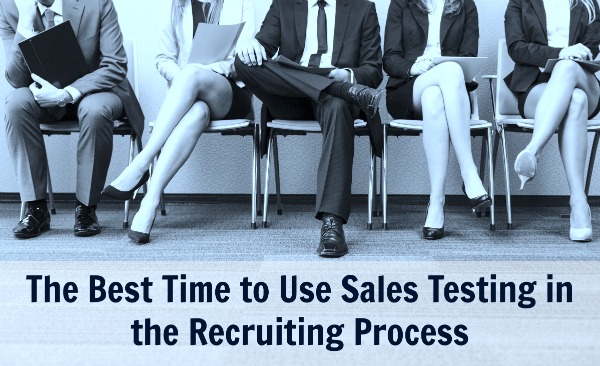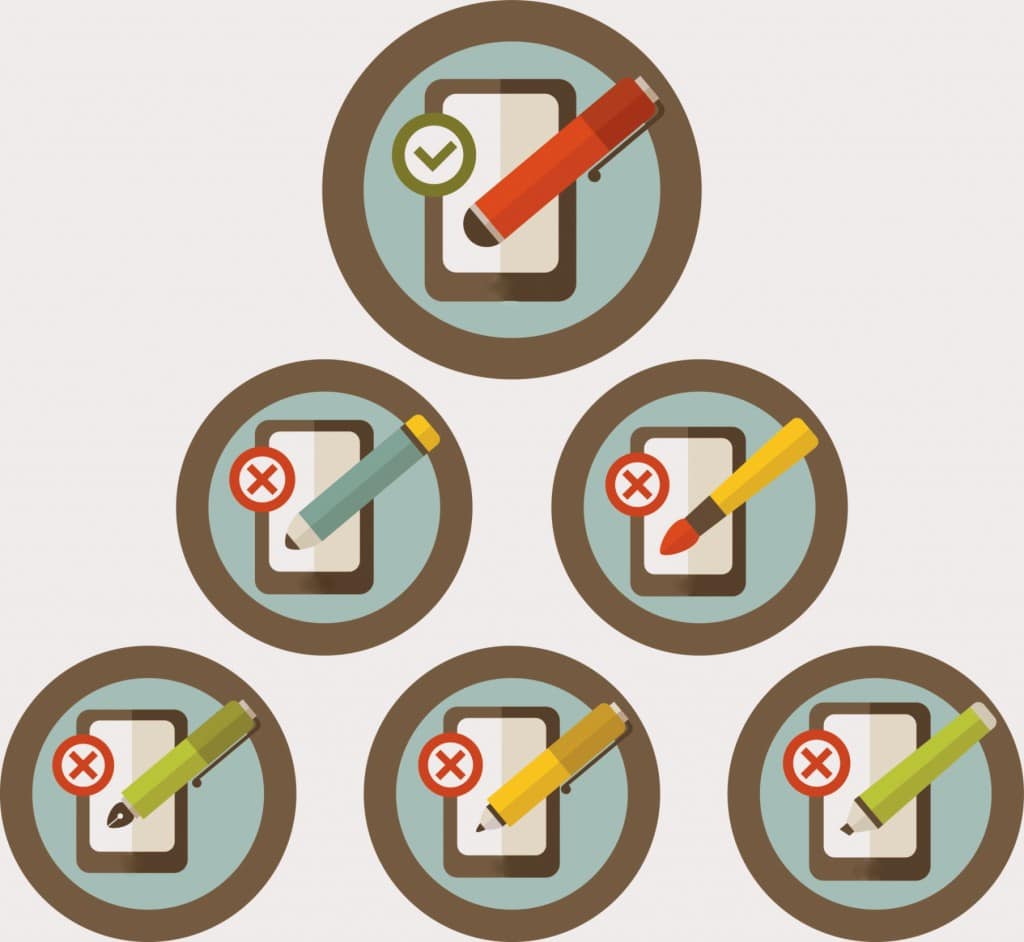 Testing is used by a variety of industries to vet initial prospects before a formal interview process begins.
Testing is used by a variety of industries to vet initial prospects before a formal interview process begins.
Highly technical fields may require a proficiency test that includes knowledge of theory and application.
Other candidates in fields that involve significant hands on work may require dexterity testing.
Sales fields rely on psychological sales assessment tests to determine if sales candidates have the necessary personality traits needed for success in sales.
Administer a Sales Assessment Early in the Hiring Process
 The most effective time to implement a sales assessment test is after a resume review and an initial phone screen, but prior to an in-person interview. Here is why.
The most effective time to implement a sales assessment test is after a resume review and an initial phone screen, but prior to an in-person interview. Here is why.
A thorough in-person interview will take anywhere from one to three hours. Multiple managers and other team members may take time out of their day to engage in the interview process.
Without anything to go off of but a resume and phone interview, an in-person interview can take longer and the risks are greater that pertinent questions relating to the person’s ability to do the job may be overlooked.
A sales test that is administered prior to the interview provides interviewers with a starting place for evaluating candidates. Ultimately, a sales assessment will save management valuable time, by weeding out low-potential prospects and directing managers’ time to higher-potential prospects.
The Harvard Business Review agrees that any test or assessment should take place before the interview. In addition to providing recruiters with an applicant pool that is more qualified, it can also effectively indicate the performance levels of candidates and highlight potentially embellished resumes.
No assessment test will provide insight into overall culture fit and personal motives, but it can be a valuable key performance indicator.
When looked at in conjunction with a resume, interviewers are provided with a much broader picture of the sales candidate. It might even inspire certain interview questions to clarify discrepancies between test results and resumes.
What Not to Do During the Sales Assessment Process
- Do not rely on an interview alone. Without an initial sales assessment, people who are good “actors” can get through an interview. It is much easier to act like a successful salesperson than to actually go out and produce over a sustained period of time.
There are great “mimics” out there who are experts in figuring out what you want them to say by listening to key words and watching you closely. While some of these skills may contribute to a sales persona, a candidate may not have other necessary traits to become a successful salesperson.
- Do not wait to test. While many managers like to test as a last step, we discourage this technique. By then, biases have been established, and if a manager likes the candidate and the candidate does poorly on the sales test, the manager is likely to bend the rules and fight for the candidate or even discredit the test.
- Do not completely forgo testing. Eliminating sales testing from your sales recruiting process increases your chances of making a bad hire.
Without the standardized and unbiased measurements of a sales assessment test, you could be missing key performance indicators. A bad hire, who has to be terminated, could cost your company hundreds of thousands of dollars and decrease overall employee morale.
Can Psychological Sales Assessments Be Unfair?
 You may have heard that sales assessments to evaluate psychological indicators are unfair or may not accurately reflect a candidate’s skills and abilities. In reality, many of the assessments do accurately measure those aptitudes for which they were designed.
You may have heard that sales assessments to evaluate psychological indicators are unfair or may not accurately reflect a candidate’s skills and abilities. In reality, many of the assessments do accurately measure those aptitudes for which they were designed.
The technology used to develop these tests is becoming more accurate every day. Successful, accurate and highly used assessments like The DriveTest™ employ multiple variations of a concept to prevent faked results, biases or other inaccuracies.
In fact, these tests can save a company from being sued at some point in the future. Using assessments to find the right fit is one of the best ways to narrow down a pool of applicants and find those who will thrive in your company’s environment, decreasing the likelihood of legal action.
While relying on an assessment alone as a means to hire is unadvisable, when properly used, these sales assessment tests are a valuable and necessary tool that most companies do not regret implementing. Sales assessments like The DriveTest™ have been refined and validated over the course of 25 years of dedicated research and development.
Choosing a Sales Assessment Test
 Finding the right sales test for your company can take time and research. There are a number of tests to choose from, but beware – many of those tests will not assess key qualities that are essential for a salesperson to actually be successful in your company.
Finding the right sales test for your company can take time and research. There are a number of tests to choose from, but beware – many of those tests will not assess key qualities that are essential for a salesperson to actually be successful in your company.
The DriveTest™ is a 42-question assessment that evaluates three inherent characteristics present in successful salespeople – Need for Achievement, Competitiveness and Optimism. None of these traits can be taught or learned, and they are difficult to measure without testing.
Many candidates may exhibit one or more of these traits in an interview process, but fail to perform consistently on the job. An unbiased sales test is the best way to predict the productivity of such individuals in a sales environment over time and is often the missing piece in the sales recruitment process to prevent poor hiring decisions.
Remember
The best time to implement a sales test is early in the process. By engaging in the testing process along with resume reviews, you’re allowing the test to do its job of weeding out pretenders and identifying potential winners. Then, when you step in and interview, you can spend your time and energy more efficiently.
Using the sales assessment tool early on will save time and money in the long run, and your sales team and company can continue to run smoothly during and after the recruitment process.
 Account Login
Account Login




